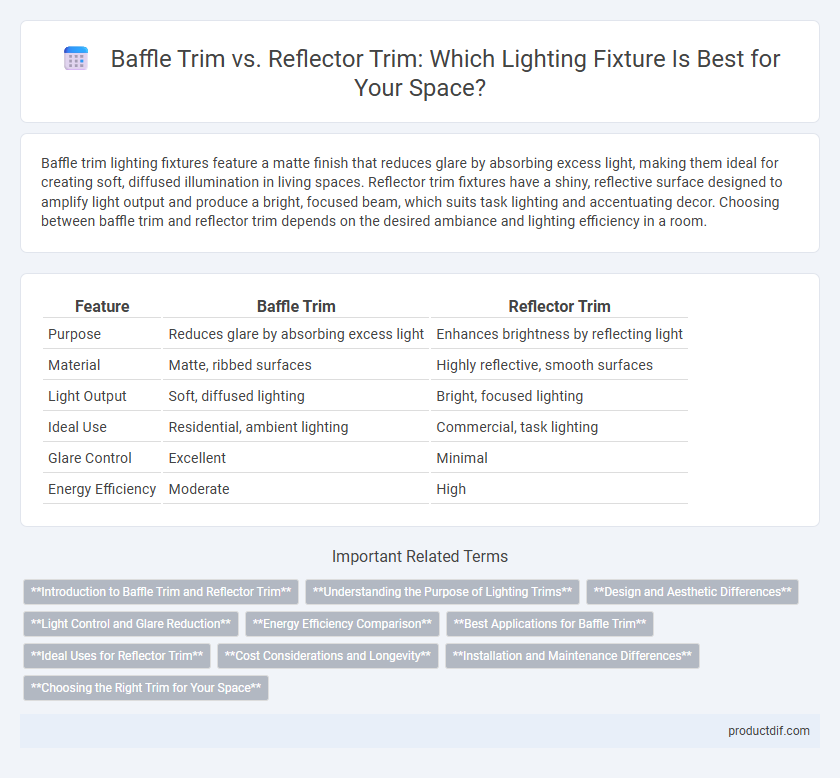Baffle trim lighting fixtures feature a matte finish that reduces glare by absorbing excess light, making them ideal for creating soft, diffused illumination in living spaces. Reflector trim fixtures have a shiny, reflective surface designed to amplify light output and produce a bright, focused beam, which suits task lighting and accentuating decor. Choosing between baffle trim and reflector trim depends on the desired ambiance and lighting efficiency in a room.
Table of Comparison
| Feature | Baffle Trim | Reflector Trim |
|---|---|---|
| Purpose | Reduces glare by absorbing excess light | Enhances brightness by reflecting light |
| Material | Matte, ribbed surfaces | Highly reflective, smooth surfaces |
| Light Output | Soft, diffused lighting | Bright, focused lighting |
| Ideal Use | Residential, ambient lighting | Commercial, task lighting |
| Glare Control | Excellent | Minimal |
| Energy Efficiency | Moderate | High |
Introduction to Baffle Trim and Reflector Trim
Baffle trim and reflector trim are two common types of lighting fixture trims designed to control light distribution and reduce glare. Baffle trims feature ridged surfaces that absorb excess light, making them ideal for creating a softer, diffused illumination in residential and commercial spaces. Reflector trims have smooth, reflective interiors that direct light more efficiently, enhancing brightness and focusing light output for task lighting or accent purposes.
Understanding the Purpose of Lighting Trims
Baffle trims reduce glare and diffuse light by using ridged surfaces, making them ideal for creating soft, ambient illumination in residential and commercial spaces. Reflector trims feature smooth, reflective interiors that direct light more efficiently and brightly, enhancing task lighting and spotlighting applications. Selecting the appropriate trim improves lighting quality and energy efficiency while aligning with design aesthetics and functional requirements.
Design and Aesthetic Differences
Baffle trim features a ribbed, matte finish that reduces glare by absorbing light, creating a soft, subdued illumination ideal for modern and minimalist interiors. Reflector trim, with its smooth, polished surface, enhances brightness by reflecting light outward, making spaces appear more vibrant and open. The choice between baffle and reflector trims significantly impacts the visual ambiance and design style of a room, influencing both functionality and aesthetic appeal.
Light Control and Glare Reduction
Baffle trims excel in light control and glare reduction by utilizing deep ridges that absorb excess light, minimizing harsh reflections and creating a softer illumination. Reflector trims enhance brightness by reflecting light outward but tend to produce more glare due to their shiny surface. Choosing baffle trim is ideal for environments requiring reduced eye strain and focused lighting, whereas reflector trims suit spaces needing maximum light output.
Energy Efficiency Comparison
Baffle trim reduces glare by absorbing excess light, which can lead to softer illumination and potentially lower energy usage through more effective light distribution. Reflector trim directs and amplifies light with a reflective surface, enhancing brightness but may require higher wattage bulbs to achieve desired illumination levels. Energy efficiency depends on the balance between glare control in baffle trims and intensity amplification in reflector trims, influencing both fixture performance and electricity consumption.
Best Applications for Baffle Trim
Baffle trim excels in reducing glare and softening light output, making it ideal for living rooms, bedrooms, and hospitality settings where comfortable, ambient lighting is essential. Its textured interior surface absorbs excess light, preventing harsh reflections and enhancing visual comfort. Baffle trim is also preferred in spaces with elevated ceilings or task areas requiring controlled illumination without glare.
Ideal Uses for Reflector Trim
Reflector trim is ideal for task lighting and highlighting specific areas due to its ability to direct light more precisely with a focused beam. It is commonly used in kitchens, retail displays, and galleries where accent lighting enhances visibility and visual appeal. The reflective surface maximizes light output, making it efficient for spaces requiring bright, concentrated illumination.
Cost Considerations and Longevity
Baffle trims typically cost less upfront due to their simpler design, while reflector trims can be more expensive because of their reflective coatings and materials. Baffle trims tend to have longer lifespans in reducing glare and controlling light, as their matte finish resists dirt and discoloration better than the glossy surface of reflector trims. Reflector trims may require more frequent cleaning and replacement to maintain optimal light output and aesthetic appeal.
Installation and Maintenance Differences
Baffle trims feature a ribbed interior that reduces glare and are typically easier to clean, requiring less frequent maintenance due to their ability to absorb excess light. Reflector trims have a smooth, shiny interior surface designed to maximize light output but can attract dust and fingerprints, necessitating more regular cleaning to maintain brightness. Installation of baffle trims often involves a snug, friction-fit design for quick replacement, whereas reflector trims may require additional securing clips to hold their reflective surface in place, impacting installation time.
Choosing the Right Trim for Your Space
Selecting the right trim for your lighting fixture depends on both aesthetic preferences and functional needs; baffle trims reduce glare with ribbed interiors, creating a softer, more diffuse light ideal for living rooms and bedrooms. Reflector trims have a smooth, shiny surface designed to maximize light output and brightness, making them suitable for task-oriented spaces like kitchens and offices. Evaluating the balance between glare control and light intensity helps ensure optimal ambiance and energy efficiency in your chosen environment.
Baffle Trim vs Reflector Trim Infographic

 productdif.com
productdif.com